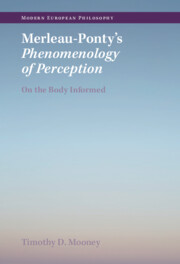Book contents
- Merleau-Ponty’s Phenomenology of Perception
- Modern European Philosophy
- Merleau-Ponty’s Phenomenology of Perception
- Copyright page
- Contents
- Acknowledgements
- Abbreviations
- Preface
- Chapter 1 Phenomenology and Objective Thought
- Chapter 2 Sensations, Associations and Explanations
- Chapter 3 Attention, Judgement and Other Work
- Chapter 4 Back to the Experience of the Body
- Chapter 5 The Body Schema and Our Skills
- Chapter 6 Motor Intentionality and Our Landscapes
- Chapter 7 Others Expressive, Engaged and Exposed
- Chapter 8 Language, Speech and Affectivity
- Chapter 9 Temporality, Subjectivity and Idealisation
- Bibliography
- Index
Chapter 5 - The Body Schema and Our Skills
Published online by Cambridge University Press: 03 November 2022
- Merleau-Ponty’s Phenomenology of Perception
- Modern European Philosophy
- Merleau-Ponty’s Phenomenology of Perception
- Copyright page
- Contents
- Acknowledgements
- Abbreviations
- Preface
- Chapter 1 Phenomenology and Objective Thought
- Chapter 2 Sensations, Associations and Explanations
- Chapter 3 Attention, Judgement and Other Work
- Chapter 4 Back to the Experience of the Body
- Chapter 5 The Body Schema and Our Skills
- Chapter 6 Motor Intentionality and Our Landscapes
- Chapter 7 Others Expressive, Engaged and Exposed
- Chapter 8 Language, Speech and Affectivity
- Chapter 9 Temporality, Subjectivity and Idealisation
- Bibliography
- Index
Summary
Here I commence my explication of Merleau-Ponty’s theory of the body schema. Our skills are deployed through this sub-reflective schema, which lies behind our pre-reflective or proprioceptive awareness of posture. I focus on his interpretation of the phenomenon of the use-phantom limb as silhouetting our ordinary performances because it is continuous with the rest of the body. Ordinarily our skilled readiness-of-hand and readiness-of-leg are not represented or objectified, not being thematic or focal powers of action. Rather they are ‘regions of silence’ that we take for granted. I show what the schema can exclude (inoperative areas of the body), what it can incorporate (implements it uses proficiently), and why it is an a priori condition of cognitive distanciation and of reckoning with the possible. We reckon with imagined actions that are immediate possibilities for us, and in the process we also draw on a reservoir of sedimented concepts and convictions.
- Type
- Chapter
- Information
- Merleau-Ponty's Phenomenology of PerceptionOn the Body Informed, pp. 105 - 129Publisher: Cambridge University PressPrint publication year: 2022

